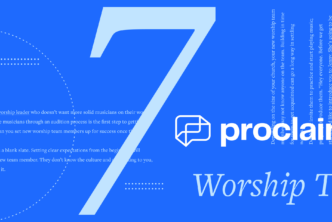In many areas of the church, as in life, we gravitate toward the extremes. This tendency is perhaps most visible in our congregational singing.
Contrary philosophy of worship can be framed in a number of different ways. Some understand worship to be a means to an end, others an end itself. Some purposefully choose songs directed to God, others songs written about God. I prefer to understand the two primary schools of thought to be worship that engages the thoughts and worship that engages the emotions.
Is worship meant to engage the mind or the heart? Is it meditating on complex ideas, or feeling deep passion that matters most? Is the goal of congregational worship best reached by heady hymns or by sweeping anthems? Now, of course you’re thinking, “It’s both/and, not either/or.” And of course that’s true. But I don’t see that being the case in most churches or individuals.
On the one side, you have those contending that passion, an engagement of the emotions, is the greatest concern in worship. This has been the general thrust in American Christianity through the ’80s and ’90s. Influenced in part by the seeker-sensitive movement, the trend of worship songs being written and sung in most churches has been toward simple lyrics and melodies, repetition, an openness to the Spirit’s leading, and full-band accompaniment. Songs are often written in the first person and are sung to, rather than about, God to highlight the personal nature of a relationship with God (like “Lord, I Lift Your Name On High” and “Foreverandever etc.“). The intent, in part, is to create a powerful experience for people to encounter God, primarily with their emotions.
On the other side, you have those arguing that feeding the mind with theology—the deep truths of who God is and what he’s done—is the greatest concern in worship.
This philosophy, while prominent through much of church history, has seen a rise in neo-Calvinism. Lyrical content is of utmost importance and theologically rich hymns are the banner flag. Many songs emphasize God’s transcendence and otherness (“Revelation Song,” for example). The conviction is that God’s Word carries power in itself, and the act of singing his truth puts us in a position to be moved and molded by his words.
So how do we refrain from pushing to the extremes in our congregational worship? Here are three guidelines:
- Worship ought to be a holistic experience.
That is, worship involving every part of our being. “You shall love the Lord your God with all your heart and with all your soul and with all your mind” (Matt. 22:37). It is important to pursue engagement of both our minds and hearts as we seek the Lord. Yet even that is not enough. If we spend hours meditating on God’s truth with our minds, if we passionately encounter God with our emotions—but don’t go out and put any of it into action—we are, in the words of Paul, “a noisy gong or a clanging cymbal” (1 Cor. 13:1). - Every individual encounters God in different ways.
Some of us encounter God more through thought, and some of us encounter him more through feeling. This is simply how God made us. While one person grows most in love for God through a study of theology, another person grows most through three hours in silence and prayer. Recognizing this ought to keep us from jumping to conclusions that the way “they” worship is not the right or “biblical” way. - Unholy competition fuels our race to the extremes.
Each position becomes more entrenched, demonizing the other side. Each side becomes more focused on NOT doing what “they” are doing than on prayerfully seeking what God would have us do. We ought to be careful not to falsely characterize or generalize others, lumping them into a group where we assume everybody is the same. Instead, we ought to seek more dialogue and look for how we can grow. Both the mind-focused and heart-focused approaches to worship have things to offer the church as a whole—and both approaches become unhealthy when pushed to the extremes.
In conclusion, I am not suggesting that we forego all judgment or that all approaches to worship are equally biblical and healthy. We should maintain our convictions, but we should also honestly assess, listen to, and love those who share different opinions than us.
* * *
No matter which side you favor, you can make your worship services look more awesome with Proclaim Church Presentation Software. Proclaim comes loaded with a library of multimedia resources worth more than $1,000 (and growing). Kill two birds with one stone: download Proclaim and get a ton of great stuff that you can use right away.




